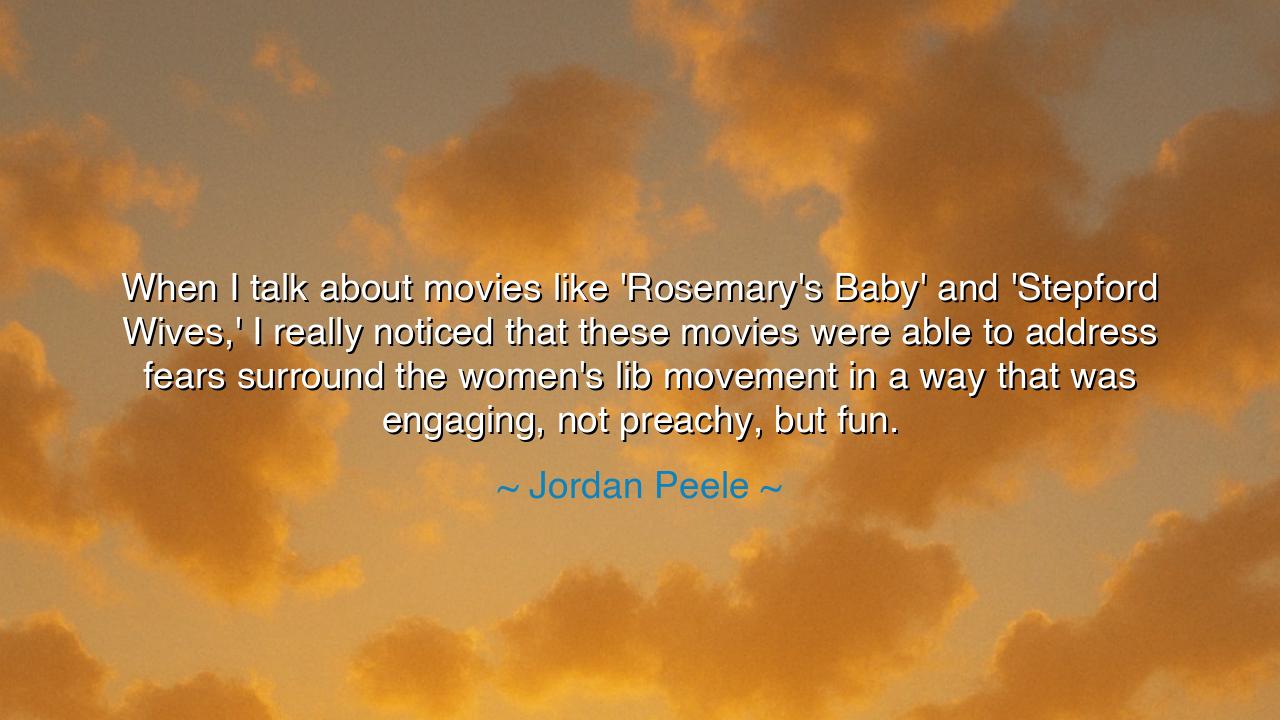
When I talk about movies like 'Rosemary's Baby' and 'Stepford
When I talk about movies like 'Rosemary's Baby' and 'Stepford Wives,' I really noticed that these movies were able to address fears surround the women's lib movement in a way that was engaging, not preachy, but fun.






Jordan Peele’s words, “When I talk about movies like ‘Rosemary’s Baby’ and ‘Stepford Wives,’ I really noticed that these movies were able to address fears surrounding the women's lib movement in a way that was engaging, not preachy, but fun,” speak with the clarity of a great truth—how film can serve not only as entertainment but as a mirror to the fears, tensions, and changes of its time. Peele, in his keen observation, highlights the remarkable power of cinema to address deep societal concerns, to reflect back the anxieties of a culture without directly confronting them, but by embedding these fears within compelling narratives that capture both our imaginations and our realities.
In the midst of the 1960s and 1970s, as the women’s liberation movement gained momentum, challenging centuries of patriarchal control, there was a growing sense of unease. The roles of women in society were evolving, and with this evolution came a fear of the unknown, of how society would change and adapt. Films like 'Rosemary's Baby' and 'The Stepford Wives' became avenues for the exploration of these fears, embedding them within the framework of horror and psychological thriller. These films cleverly used suspense and mystery to address the unsettling shifts in gender dynamics. 'Rosemary’s Baby', with its tale of a woman being manipulated and controlled by sinister forces, mirrored the fears that women faced in a world where they were asserting their rights, their voices, and their place in society. 'The Stepford Wives', meanwhile, depicted women as being turned into robotic, compliant figures, reflecting fears that the advancement of women’s rights might ultimately lead to a loss of individuality and autonomy.
This technique—of addressing deep fears through entertainment rather than direct confrontation—is not new. It has long been the role of storytelling to weave complex ideas into narratives that resonate with the soul without overwhelming the listener or viewer. Consider the ancient Greek tragedies, which often dealt with the most profound questions of fate, justice, and human nature, but did so through engaging, dramatic spectacles. Sophocles’ 'Antigone' tells the story of a woman defying a king's decree to honor her dead brother, an act that symbolizes the tension between individual will and societal law. Through its tragic unfolding, it offers a reflection on duty, family, and the cost of defiance. It does not preach—it merely shows, leaving the audience to confront the complexities of life and choice on their own.
In the same way, Peele’s admiration for these films reveals their ability to tap into the collective subconscious, to address the unspoken anxieties of a generation and translate them into a culturally significant art form. Just as the myths of the ancients reflected the fears of the people, films like Rosemary's Baby and The Stepford Wives were reflections of their time—of a world grappling with change, and of the struggle to understand what that change would mean for the future. These films embodied the terror of losing control, of women becoming either the victims of sinister plots or the products of male-dominated ideals—both of which were fears deeply tied to the growing power of women’s voices in the political and social spheres.
Peele’s insight invites us to consider the profound power of art to engage with societal change, not by preaching or forcing a viewpoint, but by creating stories that stir our emotions, provoke thought, and invite us to grapple with the uncomfortable truths we would rather avoid. In the face of any movement for social change, whether it be women’s rights, racial equality, or environmental sustainability, there are always fears that rise up in response—fears that may not be openly discussed but are deeply felt. Movies, like the myths of old, can offer a means of exploring these fears without the need for direct confrontation, allowing us to come to our own conclusions, guided by the emotional power of the story.
Consider, too, the example of the Civil Rights Movement, where the films of the 1960s and 1970s began to reflect the changing dynamics between races. One such film, “Guess Who’s Coming to Dinner”, portrayed the tension of interracial marriage during a time of intense social upheaval. It did not lecture or condemn, but instead presented the competing emotional forces within a family as they confronted this challenge. Similarly, films like 'Rosemary's Baby' and 'The Stepford Wives' did not dictate a single view on the evolving role of women, but opened a window to the deeper cultural fears that emerged in response to change, presenting them in a way that was engaging and entertaining, yet deeply thought-provoking.
The lesson in Peele’s words is clear and potent: art, and specifically film, has a profound ability to address societal fears and struggles, not through forceful argument, but through nuanced storytelling that resonates with the hearts and minds of its audience. As you reflect on your own experiences, take note of the narratives you encounter in your life. Are they engaging you to think deeply, to confront fears you might not yet understand? Like the movies Peele admires, let your own stories—whether through your work, your actions, or your art—be reflections of the challenges and triumphs of your time. Create not to preach, but to invoke thought, to spark conversation, and to invite others into the journey of understanding. In this, you will be a storyteller in the truest sense, shaping the future through the power of reflection and art.






AAdministratorAdministrator
Welcome, honored guests. Please leave a comment, we will respond soon